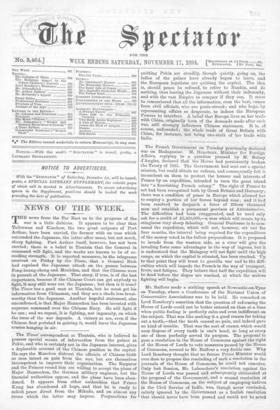The Times' correspondent at Tientsin, who is believed to possess
special means of information from the palace at Pekin, and who is certainly not in the Japanese interest, gives a deplorable account of the Chinese position in the capital. He says the Manchus distrust the officials of Chinese birth as men intent on gain from the war, but are themselves incompetent to improve their organisation. The Emperor and the Princes round him are willing to accept the plans of Major Rannecken, the German military engineer, but the _financial authorities oppose, and the plans have been aban- doned. It appears from other authorities that Prince Kung has abandoned all hope, and that he is ready to solicit peace direct from the Mikado, and on almost any terms which the latter may impose. Preparations for
quitting Pekin are steadily, though quietly, going on, the ladies of the palace have already begun to leave, and the European legations are quitting the capital. The idea is, should peace be refused, to retire to Nankin, and do nothing, thus leaving the Japanese without their indemnity, and with the vast Empire to conquer if they can. It must be remembered that all the information, even the best, comes from civil officials, who are panic-struck; and who hope, by representing affairs as desperate, to induce the European Powers to interfere. A belief that Europe lives on her trade with China, originally born of the demands made after each war, still strongly influences Chinese statesmen. It is, of course, unfounded ; the whole trade of Great Britain with China, for instance, not being one-sixth of her trade with India.


















































 Previous page
Previous page